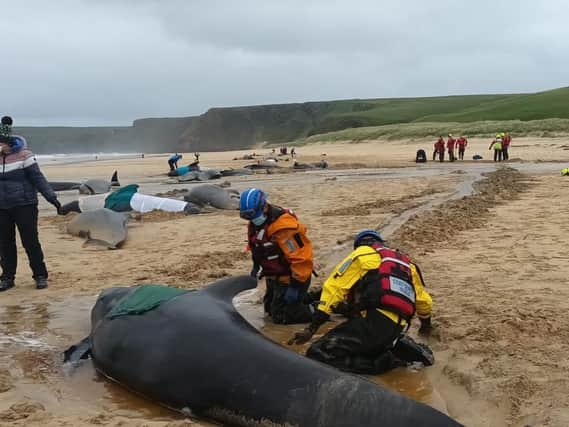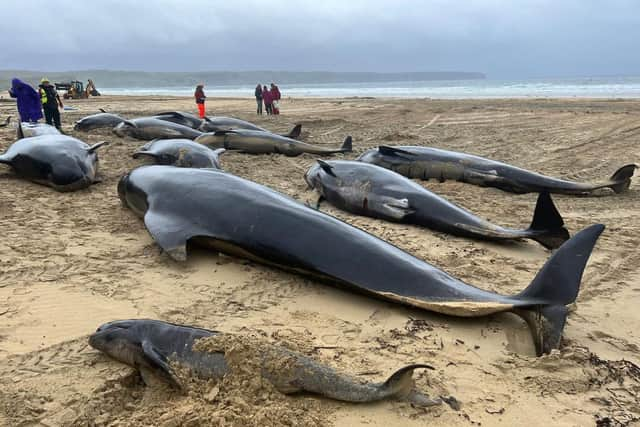Isle of Lewis whale stranding: Pod of 50 pilot whales dead in 'one of Scotland's biggest ever mass strandings'


A pod of more than 50 pilot whales has died on an Isle of Lewis beach, in what experts say might be the largest stranding in Scotland's history.
Rescuers were called to Traigh Mhor in North Tolsta, on the Isle of Lewis, to reports that dozens of the marine mammals were in difficulty at around 7am on Sunday (16 July). Initial reports suggested the pod was made up of around 55 whales - an mixture of both adults and calves, but rescuers soon realised only 15 were still alive.
Advertisement
Hide AdAdvertisement
Hide AdBritish Divers Marine Life Rescue (BDMLR) tried to refloat two whales stranded closer to the waterline on the outgoing tide, and one managed to swim away. However, the other subsequently re-stranded, as did three more.
At 3.30pm on Sunday, it was decided that the rest of the pod would be euthanised on welfare grounds.


On Monday morning, Dr Andrew Brownlow from the Scottish Marine Animal Stranding Scheme (SMASS) told BBC’s Good Morning Scotland that it was one of the biggest mass strandings the organisation had ever dealt with.
“In terms of the number of casualty animals, this is the biggest one we’ve had. This is one of the biggest pilot whale mass strandings we’ve ever dealt with.”
Advertisement
Hide AdAdvertisement
Hide AdOn Monday, SMASS will be working to determine what caused the pod to strand and die, but Dr Brownlow said they believed the whales could have come onto a “very shallow” beach in quite bad weather.
“Because they’re pilot whales, they form very strong social bonds," he continued. “So if one animal goes on to the beach for whatever reason then it can be that the entire pod will follow and that is basically what happened in this case.”
A statement from BDMLR on Sunday said one of the dead females appeared to have just given birth, and suspected the pod had followed her. “Pilot whales are notorious for their strong social bonds, so often when one whale gets into difficulty and strands, the rest follow.”
Dr Brownlow added that determining the cause of death would be a “monumental task”, and his team would need to get to work straight away. “We will select the animals we think best represent the rest of the pod and make sure we take samples and as much data from those as we can.
Advertisement
Hide AdAdvertisement
Hide Ad"Then it’s simply a race against time, energy and weather," he added. “We will do the most we possibly can to find out what’s going on here.”
The whales will be moved to a landfill site in Stornoway to be worked on, but would be buried after the post-mortem examinations were complete.
Comment Guidelines
National World encourages reader discussion on our stories. User feedback, insights and back-and-forth exchanges add a rich layer of context to reporting. Please review our Community Guidelines before commenting.
